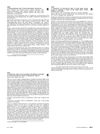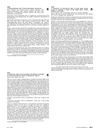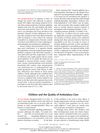 October 2021 in “Turkderm”
October 2021 in “Turkderm” Hormonal imbalances, not insulin resistance or dyslipidemia, may be more important in causing acne in women over 25.
September 2021 in “GLOBAL JOURNAL FOR RESEARCH ANALYSIS” The hormonal contraceptive combination effectively reduces androgen excess and improves PCOS symptoms like acne, hair loss, and menstrual issues.
 July 2021 in “International Journal of Homoeopathic Sciences”
July 2021 in “International Journal of Homoeopathic Sciences” Certain factors can trigger hormonal imbalances and cyst formation, leading to Polycystic Ovarian Syndrome (PCOS).
[object Object]  March 2021 in “Serbian Journal of Experimental and Clinical Research”
March 2021 in “Serbian Journal of Experimental and Clinical Research” PCOS is a complex hormonal disorder with no clear cause or single diagnostic test, and current treatments focus on symptoms.
 August 2019 in “bioRxiv (Cold Spring Harbor Laboratory)”
August 2019 in “bioRxiv (Cold Spring Harbor Laboratory)” The model successfully predicted new uses for existing drugs, like using certain hormonal and heart medications for respiratory and Parkinson's diseases, and a cancer drug for diabetes.
August 2019 in “Journal of the American Academy of Dermatology” Frontal fibrosing alopecia may be caused by an autoimmune reaction and hormonal imbalance.
 January 2019 in “Obstetrics & Gynecology International Journal”
January 2019 in “Obstetrics & Gynecology International Journal” Hormonal changes and conditions like polycystic ovarian syndrome are major causes of adult acne in women, with varying prevalence among different ethnicities.
 January 2019 in “The Annals of Thoracic Surgery”
January 2019 in “The Annals of Thoracic Surgery” The document concludes that careful planning and execution of facial gender affirmation surgery after at least 12 months of hormonal therapy can improve the quality of life for transgender individuals.
 January 2019 in “Paëmi Sino”
January 2019 in “Paëmi Sino” Women with keloid scars often have acne and hair loss, especially those with "true" keloids, indicating a possible hormonal imbalance.
 January 2019 in “Springer eBooks”
January 2019 in “Springer eBooks” Acne can appear or persist in adulthood due to hormonal changes, external factors, or substance use, and requires appropriate treatment.
 November 2018 in “International Journal of Current Pharmaceutical Research”
November 2018 in “International Journal of Current Pharmaceutical Research” PCOS is a hormonal disorder causing symptoms like irregular periods and acne, and increases the risk of diabetes and heart disease.
 September 2018 in “Journal of the American Academy of Dermatology”
September 2018 in “Journal of the American Academy of Dermatology” Elderly patients with CCCA were all African American with low vitamin D, but no iron or zinc deficiencies, and no hormonal imbalances compared to younger patients.
 January 2018 in “Springer eBooks”
January 2018 in “Springer eBooks” The document says that early treatment of Acne Vulgaris is important to prevent scarring and that adult onset acne is common in women, often due to hormonal imbalances.
 June 2017 in “Journal of The American Academy of Dermatology”
June 2017 in “Journal of The American Academy of Dermatology” Women in Australia report different signs of facial aging compared to women in the US, UK, and Canada; men with Lichen planopilaris often have hormonal abnormalities and thyroid disease.
 June 2017 in “Journal of The American Academy of Dermatology”
June 2017 in “Journal of The American Academy of Dermatology” Most men with lichen planopilaris had it confirmed by biopsy and often had thyroid issues, sexual dysfunction, or prostate cancer, hinting at a link with hormonal problems.
 January 2016 in “Springer eBooks”
January 2016 in “Springer eBooks” Pubertal acne is linked to hormonal changes, affects quality of life, and is treated similarly to adult acne.
January 2016 in “Dermatology Online Journal” Hormonal therapy changes skin and hair in transgender patients, who need better researched dermatologic care.
 January 2008 in “The New England Journal of Medicine”
January 2008 in “The New England Journal of Medicine” Children receive less than half of recommended health care, and routine hormonal testing for female-pattern hair loss is unnecessary without other androgen excess symptoms.
 November 2004 in “Medical Journal of Indonesia”
November 2004 in “Medical Journal of Indonesia” Hormonal imbalances can cause skin and hair problems in women, and treatments that block male hormones can help.
 January 2003 in “Springer eBooks”
January 2003 in “Springer eBooks” Androgenic alopecia is a type of hair loss that's partly inherited and can be due to hormonal imbalance.

Minoxidil is better for female hair loss without hormonal issues, cyproterone acetate for those with; people with treated congenital heart disease have lower life quality; personality differs in types of infertility; oral terbinafine is best for toenail fungus; bladder training reduces incontinence; nurse clinics help with heart disease; weight loss improves body composition and liver disease; computer training cuts drug errors.
 December 1997 in “Journal of The European Academy of Dermatology and Venereology”
December 1997 in “Journal of The European Academy of Dermatology and Venereology” Most women with excessive hair growth have a hormonal cause.
[object Object]  October 1971 in “The BMJ”
October 1971 in “The BMJ” Hair loss can be linked to hormonal changes, and physical conditions like heart defects can cause depression.
October 2022 in “International Journal of Research in Dermatology” Hormonal imbalances contribute to female hair loss, and trichoscopy is a useful diagnostic tool.
January 2020 in “Journal of Clinical Dermatology” Treating underlying metabolic and hormonal issues is key to managing female hair loss.
 January 2014 in “Jaypee Brothers Medical Publishers (P) Ltd. eBooks”
January 2014 in “Jaypee Brothers Medical Publishers (P) Ltd. eBooks” Hair loss is mainly due to genes and hormones, and can be treated with minoxidil and finasteride. Excessive hair growth is linked to certain disorders and can be managed with hormonal therapy and laser hair removal.
 February 2008 in “CRC Press eBooks”
February 2008 in “CRC Press eBooks” Androgenetic alopecia is a genetic hair loss condition, more severe in men, and can also be caused by hormonal imbalances in women.
 December 2006 in “8th European Congress of Endocrinology incorporating the British Endocrine Societies”
December 2006 in “8th European Congress of Endocrinology incorporating the British Endocrine Societies” Men with early hair loss and hormonal changes like PCOS could be the male equivalent of PCOS, not linked to metabolic syndrome.
 90 citations,
December 2007 in “Current Oncology”
90 citations,
December 2007 in “Current Oncology” Non-hormonal treatments should be used first for sexual dysfunction in postmenopausal breast cancer patients on aromatase inhibitors, with hormones as a second option.
67 citations,
January 1987 in “The Journal of urology/The journal of urology” New hormonal therapies can help treat advanced prostate cancer but may cause testicular issues.
























